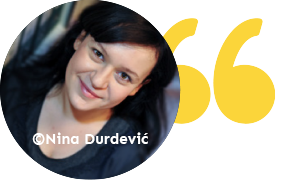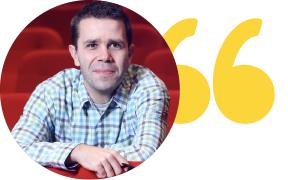Testimonials
Tamara Babun
Founder and Managing Director of Wolfgang & Dolly LLC
“Although it is challenging to find an angle for a European co-production outside of the immediate surroundings due to the limited language territory my colleagues and I find ourselves in, we do our best to develop projects that can travel beyond our borders.”
“I founded the production company Wolfgang & Dolly LLC in 2017 after a decade of freelance jobs and working in other production companies as assistant producer, line producer, junior producer, executive producer and finally a producer in my own right. The company has a diverse portfolio of projects in development. Although it is challenging to find an angle for a European co-production outside of the immediate surroundings due to the limited language territory my colleagues and I find ourselves in, we do our best to develop projects that can travel beyond our borders. Croatia is a relatively small market and there is always something to do regarding further development of national film and AV sector in a country with its own language and a modest home market in terms of population. The European film and TV sector is characterised by a large number of SMEs. Given the low number of permanent staff members and the fact that film and TV projects take long to develop, finance, produce, promote and distribute, flexibility, agility, passion and a collaborative mindset are the core competences in my company. Those competences are highly required during these unprecedented times when all our production operations are interrupted, as well as distribution ones. We are creative thinkers and problem solvers – two sets of skills that will be required for post-COVID-19. Indeed, as a producer, I see my role as both that of a creative and a businessperson. I am of course undertaking all the financial and legal risks for our productions, and I also work in close collaboration and creative synergy with our script writers and directors on each individual project. The producer always has the first or second opinion on any creative decision, whether during the development, creation or actual production phase! Like all the producers I am working within Croatia and in Europe, my ambition is to contribute to making our industry a champion in creativity, diversity and sustainability. And SMEs like mine are one of the main factors in the European innovative approach to stories to be told on screen. This is not a drawback for Europe, it is our strength that determines our role in the future.”
Tom Bert
Director of Cinema Technology, Barco
“In my position as Director of Cinema Technology, it is my job to bridge the world of technology with that of cinema and movie-making.”
Barco is headquartered in Belgium. Founded more than 80 years ago, the company has been active in cinema since the early days of digital cinema at the end of the 90s. Initially, we produced digital cinema projectors. Research and development, as well as manufacturing took place in our Belgium office. With the massive conversion of the industry from analogue to digital technology between 2005-2015, we grew to the global n°1 position in the domain of cinema projection. Also, in that period, we expanded our activities and product portfolio to media servers and audio solutions for cinema. Today, we have over a 50% market share in the global cinema projection market and over a 15% market share for media servers. In my position as Director of Cinema Technology, it is my job to bridge the world of technology with that of cinema and movie-making. It is important to scout for new innovations and trends, both on the technology side as well as the creative content creation side. Combining these with a good understanding of where cinema exhibitors want to go, could be and should be going, allows Barco to organize for a future-proof portfolio and stay ahead of the game. The COVID-19 crisis has hit the cinema market right in its heart: theater exhibition went from an almost 24/7 business to standstill. The same has happened to the content creation and production side. The impact on equipment manufacturers for cinema is there, but contained: the biggest complexity probably comes from the logistics side of getting materials in and out. Our inhouse R&D-, service- and project-teams are continuing to work, ready to support our partners and customers for the renaissance of cinema later this year!
Lorenzo Ferrari Ardicini
CEO CG Entertainment
“We strongly believe in cultural and genre diversity in our catalogue and we strive to make our audiences discover films and AV content through our online and physical services.”
As head of CG Entertainment, which is involved in both digital distribution and DVD/ Blu-ray, I am looking to acquire rights for and publish the widest possible selection of films and AV content. CG Entertainment’s catalogue includes Italian classics, European and international art house films, genres such as horror or sci-fi, children’s titles and documentaries. We strongly believe in cultural and genre diversity in our catalogue and we strive to make our audiences discover films and AV content through our online This is more important than ever in light of the unprecedented circumstances brought on by the COVID-19 pandemic. Acquiring distribution rights to films and AV content is a risky business and we work hard to recoup the investment in acquisition, marketing and distribution. Some titles do very well, others require more effort to develop an audience – each title has its own tailor-made promotion plan. We must therefore be able to rely on full commercial freedom to agree on different types of exclusivity, including territorial exclusivity, with producers of films and AV content. This helps mitigate our financial risk in acquisition and to works towards recouping the investment in rights acquisition, marketing and distribution. Our mission is to ensure the best distribution of and best access to the films and AV content in our catalogue – that is why we are in business.”
Suzanna Holmqvist
Chief Marketing Officer, Svenska Bio
“My most memorable childhood experience was Disney’s The Fox and the Hound. I saw it during the school summer break, and I remember that when the teacher asked us what we did during summer, the visit to the cinema, watching The Fox and the Hound, was all I wanted to talk about.”
“Svenska Bio is a family-owned cinema chain founded in 1914 in Sweden, today operating 200 screens in Sweden, Finland and Denmark. Our company is renowned for its efforts towards providing audiences with the best possible cinematic experience, regularly investing in new technology and innovative marketing strategies. My family have always been in exhibition, so I grew up loving the cinema. But my most memorable childhood experience was Disney’s The Fox and the Hound. I saw it during the school summer break, and I remember that when the teacher asked us what we did during summer, the visit to the cinema, watching The Fox and the Hound, was all I wanted to talk about. As Chief Marketing Officer at Svenska Bio, my focus is to enhance our customers’ journey and the challenge is to choose from the many opportunities to do so. Which ones should we focus on and when? What will make the largest impression on the audience to make them come back and visit us soon? Amongst the various projects we worked on in the past, I have helped our company transition to cashless in November 2016 – a world-first for a major cinema chain. And we continue to adapt and innovate for the changing needs and preferences of our customers. During the current pandemic we have been required to adapt to a situation that is new to all of us. Not even during World War II did my great grandfather need to close his cinemas. But we have had to now. But instead of totally pulling down the curtain, we have started what we call On Demand Cinema. Our customers can rent an auditorium of their own to either watch a movie or play video games. This has proved to be enormously popular and it keeps cinema going in the minds of our customers and our staff a bit occupied during these exceptional times.”
William Maunier
European President UNI MEI
“The audiovisual sector has been experiencing radical changes during the last decade and is now facing unprecedented uncertainty amid the COVID-19 pandemic.”
“The audiovisual sector has been experiencing radical changes during the last decade and is now facing unprecedented uncertainty amid the COVID-19 pandemic. Globalisation, the financial crisis and digitalisation have led large segments of our industry to transform business models and change the way of work. This transformation is characterised by the emergence of new modes of production and distribution. It has radically changed the skillset demanded for new and evolving jobs. At the same time, change is driven by audiovisual people that seek more inclusion and equality to be reflected in the stories we tell and at the workplace. These transformations are of a global nature and offer an opportunity for more cultural exchange, sustainable growth and quality jobs. However, long-term cooperation among competing actors – businesses and people – is key to make this transformation successful. Women and men in front and behind the camera, set and screen are hit hard by the economic and social impact of the pandemic. They turn to business and union leaders not only to mitigate the impact but to build a sustainable path to recovery for the AV sector through dialogue. I would like to highlight three opportunities for cooperation that are important for the future of the European audiovisual sector: mutualisation of skills development should be supported to ensure upskilling for a largely freelance workforce; sector initiatives committing all stakeholders to boost equality and inclusion are a prerequisite to bring about a cultural change; the promotion of collective bargaining is key to establish a level playing field among all actors in the Single Market. The structural, technological and social transformation is likely to intensify. We embrace change and believe that strong partnerships make growth and quality jobs happen.”
Eric Meyniel
International Content Director, Kinepolis Group
“I was not even 4 yet when I saw my first movie on a Big Screen. My parents went to see Le Chat with Jean Gabin & Simone Signoret. I was fascinated by the screen and I still have the final scene very clear in mind »
Kinepolis Group NV was founded in 1997 as a result of the merger of two family-run cinema groups. In addition to its cinema business, the Group is also active in film distribution, event organization, screen publicity and property management. In Europe, Kinepolis has 55 cinemas spread across Belgium, the Netherlands, France, Spain, Luxembourg, Switzerland and Poland. Since the recent acquisition of Canadian movie theatre group Landmark Cinemas and American movie theatre group MJR, Kinepolis also operates 45 cinemas in Canada and 10 in the US – for a total of 110 cinemas, 1,074 screens and almost 200,000 seats worldwide. I was not even 4 yet when I saw my first movie on a Big Screen. My parents went to see Le Chat with Jean Gabin & Simone Signoret. I was fascinated by the screen and I still have the final scene very clear in mind. Then I discovered Mary Poppins which was more in accordance with my age. As International Content Director, I’m in charge of elaborating and implementing Kinepolis’ booking and programming strategy adapted to each market to increase the number of admissions, Gross Box Office and enlarge audiences in all our cinemas. I dedicate most of my time to attending film markets, festivals or conventions, meeting up with our partners from distribution, negotiating, analysing markets and trends, elaborating action plans and sharing with our teams around the world. The current COVID-19 crisis has proved how much every actor of the industry are interdependent. Collaboration and joined forces have probably never been so necessary as well as the necessity to keep the connection with audiences as well as designing the right programs to our movie-goers.
Anjani Patel
Head of Inclusion and Diversity Producers’ Alliance for Cinema and Television (PACT)
“At Pact, we have launched programs that are dedicated to shift the dial on diversity and inclusion.”
We believe that diversity is good for business. UK independent TV production brings in revenues of over £3 billion a year. Yet in an increasingly complex marketplace, producers must find original stories that resonate with audiences in the UK and worldwide. At Pact, we have launched programs that are dedicated to shift the dial on diversity and inclusion. We support and work with Project Diamond, a unique cross industry diversity monitoring and data collection system focusing on the major UK broadcasters. Our Inclusive Leadership Laboratory launched in 2017 provides tailored support for senior leaders who want to develop their inclusion strategy. We also run two entry level initiatives for under-represented groups, in London and Scotland. Each trainee undergoes a 6-month paid placement at an independent production company, working in entry level roles from runner to development researcher. The scheme has an impressive retention rate with 77% of its alumni still working in TV, film and related industries. Responding to gaps and challenges we have created bespoke programs to translate good intentions into inclusive working practices which we believe will contribute to the growth of world-class content creation in our sector now and in the future. We cannot predict the impact of the COVID-19 lockdown on our industry, but going forward, we stay committed to helping the sector to shift the balance on Diversity and Inclusion.”
Oliver Berben
Executive Board Television, Digital Media, Entertainment Constantin Film AG
“Constantin Television is a subsidiary of Constantin Film handling development and production of national and international audiovisual works that are not designed for theatrical release. The high-end tv-series Wir Kinder vom Bahnhof Zoo (8x1h), based on the famous international bestselling German book, is one of the most ambitious of these productions.”
Exclusive rights form an essential part of the European producers’ business models. For 40 years Constantin Film has played a crucial role in establishing German cinema both nationally and internationally and is considered one of the most successful independent production and distribution companies in the German media landscape. From the beginning, our business was based on famous IPs and the ability to finance our feature films and non-feature productions on a territory-by-territory rights exploitation. Constantin Television is a subsidiary of Constantin Film handling development and production of national and international audiovisual works that are not designed for theatrical release. The high-end tv-series Wir Kinder vom Bahnhof Zoo (8x1h), based on the famous international bestselling German book, is one of the most ambitious of these productions. The total production cost amounted to EUR 25 million. As with any major European co-production, the funds were raised by splitting the rights into exclusive rights per territories. Wir Kinder vom Bahnhof Zoo is a co-production with Amazon (for German-speaking Europe), Wilma Films (Czech Republic for Eastern Europe) and Cattleya (Italy).
Without the ability to exercise commercial freedom by splitting the rights exclusively for the respective territories, it would hardly have been possible to raise the financing for this massive project with the inherent financial risk. Conversely, only because of the given commercial freedom have we been able to find high-profile partners that trusted our expertise and shared the financial risk with us while enabling us to What is clear is that the foundations of territoriality and commercial freedom will be even more essential to ensure the recovery of the entire AV sector in the mid-to long-term.”
Malene Ehlers
Director of Legal & Business Affairs Nordisk Film Production A/S
“ Films convey stories, ideas and dreams and give us insight into the values, concerns and preoccupations of our time. Films are the embodiment of freedom of expression and project national culture and values in our local territory, the Nordics, as well as abroad…”
Films convey stories, ideas and dreams and give us insight into the values, concerns and preoccupations of our time. Films are the embodiment of freedom of expression and project national culture and values in our local territory, the Nordics, as well as abroad. At Nordisk Film Production A/S we strongly believe in the art of creative storytelling and technological innovation to make our films easily available to audiences throughout Europe, indeed throughout the World. Films are, however, difficult to finance – even films with modest budgets. National film support, distribution advances and pre-sales are essential. Each film has its own business model and raising financing is an art… or if you are the more pessimistic type: an amazingly difficult struggle… and only for those who never give up hope. Film development and production requires substantial investment and entails significant creative and financial risk. This is why we work together with local as well as European co-producers and distributors on our film projects – those willing to take a risk on the film while it is in development. Money or other types of up-front financial commitments (e.g. MGs and presales) are required before we can greenlight and begin production of a film. As part of our financing struggle we must therefore be able to exercise full commercial freedom to use different types of exclusivity, including territorial exclusivity, to raise financing and to secure the best and widest distribution of our films by local Nordic or European distributors and platforms who will work hard to create an audience for our films both in their individual home markets and abroad. I am offering these reflections in the middle of the unprecedented situation brought on by the COVID-19 pandemic. These new circumstances will certainly not simplify our production and financing activities – if anything, they will become even more challenging.”
Neil Hatton
Chief Executive UK Screen Alliance
“We are accelerating our home-grown skills pipeline with specialist VFX courses from age 16, apprenticeships from 18 and tighter integration with universities to close the gap between graduation and work-readiness.”
The UK is a world leader in Visual Effects (VFX) for film, TV and advertising which generates over £1bn GVA. UK VFX companies are constantly innovating and developing software to achieve photo-realistic CGI, and the deployment of immense cloud computing power now allows artists to realise anything a producer can imagine, given enough time and budget. VFX needs a rare blend of creative and STEM skills. 82% of the UK workforce are graduates, including 29% post-grads. The global demand for talent means all key VFX occupations are recognised by the UK as being in shortage, giving advantages in visa applications. With over 70 nationalities in the workforce, the UK leverages much advantage from their creative and innovative diversity. However, 1 in 3 are from the EU and while many have settled status allowing them to stay after Brexit, from January 2021 new EU recruits will require visas at a cost which doesn’t exist now. We are accelerating our home-grown skills pipeline with specialist VFX courses from age 16, apprenticeships from 18 and tighter integration with universities to close the gap between graduation and work-readiness. The COVID-19 pandemic closed global filming and choked off work flowing to VFX companies. While there was work in progress, VFX continued to function by deploying remote workstations to their artists’ homes. But that work will soon run out and VFX too will suffer an extended hiatus until filming resumes. The UK’s film and TV industry recovered strongly from the 2008 financial crash with growth far exceeding the rest of the UK economy. We will repeat that growth as we emerge from the pandemic to continue as a highly innovative, high-prestige and high-productivity sector.”
Mark Lichtenhein
Chairman of the Sports Rights Owners Coalition (SROC)
“At this very difficult time for everyone involved in sport, the cancellation and postponement of events is clearly having a critical effect on the business of sport and its ability to fund its wider ecosystem.”
“Demand for different sports rights is largely territorial due to the footprint of national broadcasters and platforms, as well as the tastes and preferences of consumers – selling rights on a territorial basis is a response to this. The likely result of banning geo-blocking for sports content would be a significant fragmentation of access to European sport as dominant European broadcasters demand exclusive rights to the sports which are most valuable in their territories. Consumers switching to lower-cost sports services could start a chain of events with serious implications for the funding of European sports. This would ultimately disrupt the finely balanced sports ecosystem as well as the economics of pay TV, with reductions in investment harming the quality of the competitions as well as the ability for sports to invest and encourage participation at a grassroot level. All European consumers would lose out, and those in smaller territories would be disproportionately harmed. While the market response would likely protect some of the value of sports, it would still result in a significant impact on consumers, potentially exposing up to 115 million citizens across the EU to higher prices and reduced access to their favourite sports. The system of territorial exclusivity ensures consumers have access to the high diversity of sports across Europe that they enjoy today. At this very difficult time for everyone involved in sport, the cancellation and postponement of events is clearly having a critical effect on the business of sport and its ability to fund its wider ecosystem. Our thoughts are with all the athletes, fans, broadcasters and rights holders who have been affected by the COVID-19 health crisis and we hope that the resumption of live sport will be able to lift the spirits of the entire world in the coming months.”
John McVay
OBE Chief Executive Producers’ Alliance for Cinema and Television
“European AV exports are not only bringing in the yuan and the dollars but also the influence, engagement and interest in our unique and diverse cultures reaching hearts and minds where politics often fails.”
“Both France and the UK sit in the top five in the global ranking of soft power. The creative industries and especially the AV sector are major contributors to this. Driven by the global audience’s appetite for quality, authenticity and innovation, European AV exports are not only bringing in the yuan and the dollars but also the influence, engagement and interest in our unique and diverse cultures reaching hearts and minds where politics often fails. It would be another failure of politicians if they seek to damage this by denying European producers and creators the ability to finance these much-loved films and programmes at a time when many people around the planet are looking for new ideas, new visions and, critically, friends. The global pandemic has shown that the world is no more connected than ever before but will present new challenges if countries become more protectionist and insular. To counter these trends, it is more important than ever to enable European values and culture to connect with both current and future generations. If we step back now, then we will lose our rightful seat at the table and the economic benefits that go with it. We have built this world through; our creativity, by responding to the relentless competition in the markets and by telling the stories that audiences love. Yes, we are exporting film and TV programmes but it is much more. Europe will thrive by being more globally ambitious not less and both EU businesses and audiences will be the beneficiaries.”
Jane Millichip
Chief Commercial Officer Sky Studios
“We have a long history in developing new talent, and in partnering the best
creative practitioners in the sector; working across languages, genres and forms.“
“Sky is Europe’s leading direct-to-consumer entertainment and media company, with 24 million customers and 31,000 employees in seven European countries. Our combined businesses across technology, pay-tv, and content creation generate £13.6billion in annual revenues, putting Sky at the heart of the creative and business economy in Europe. We are home to creative excellence in the development, production and funding of original drama, comedy and documentary. We have a long history in developing new talent, and in partnering the best creative practitioners in the sector; working across languages, genres and form. That’s why last year we launched Sky Studios, our new production powerhouse, with the ambition of bringing to screen unique stories from the very best talent in Europe, and to export those stories around the world. We’re also building Sky Studios Elstree, a new state-of-the-art TV and movie studio, which will be the first sustainable and Net Carbon Zero studio in Europe. At Sky Studios, Sky, and our parent company Comcast, we are committed to more than double our investment in original content between now and 2024. At Sky, our priority in responding to the impact of Covid-19 continues to be the safety of all our customers, staff, cast and crews, while simultaneously ensuring our customers across Europe are able to rely on our services to keep them entertained, informed, and importantly, connected. As of the beginning of May 2020, the majority of Sky Studios staff are working from home, and we have temporarily paused drama production in the UK, Italy and Germany. We are now working on a plan to resume production when it is safe to do so, and to adopt best practice on all sets, with stringent health and safety protocols in place. However, COVID-19 has not dented the invention and entrepreneurial nature of the creative sector, so we are making the most of home working by accelerating our development of both existing and new IP, and we are exploring both story-telling and production techniques in a post-COVID world.”













